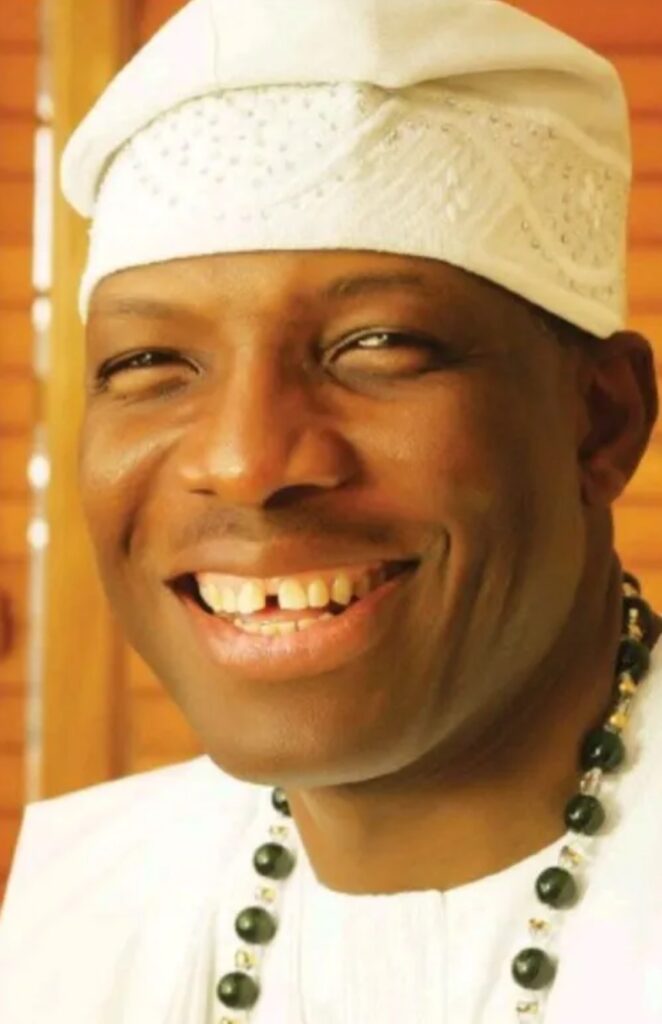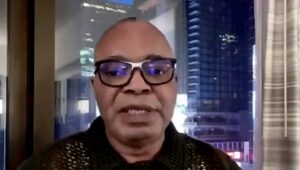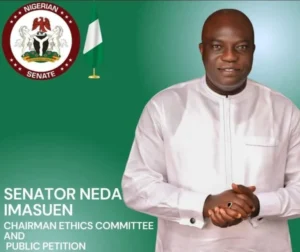Nigeria Can Boost Chocolate Production with Adequate Funding, Awareness – Oba Dokun Thompson

Oba Dokun Thompson-Gureje IV
Oba Dokun Thompson is the Oloni of Eti-Oni in Osun State and the founder of Gureje IV Chocolate Bars. In this interview with Bunmi Bailey and Feyishola Jaiyesimi of Business Day, he spoke on the state of Nigeria’s cocoa industry and his organisation’s recent partnership with a UK firm to boost local chocolate production.
Can you tell us about the International Cocoa Diplomacy?
I am a traditional ruler and the custodian of the oldest cocoa plantation in Nigeria. When I became an Oba in 2008, one of the things I needed to do was to see how we could work to harness our resources in terms of humans, our land and even natural resources which is cocoa.
We looked for ways to harness these resources to transform our community, which is basically rural, and most times, when you look at rural communities in Africa, they go in line with poverty.
How do we change that? The only way we can change that is to define for the purpose of value and wealth creation.

Another way is to have a good understanding of what we have in our hands and for us, it is cocoa – which led us to create the cocoa festival in Osun State to begin to recognise farmers’ work, appreciate them and look for creative ways to achieve a renewal of their mindset because a lot of the farmers are old.
Many are averagely above 50 years, and the next generation of farmers do not want to have anything to do with cocoa or farming.
So, how do we create sustainability by transforming our community? We have to look for ways of returning the farmers’ self-worth, dignity, and pride, which was what led to the founding of International Cocoa Diplomacy.
So, what we are doing is to create a culture of value that people can begin to understand and appreciate raw materials as they are and also understand the value that can be extracted from them.
If we are not participating in the entire value chain, we will be losing a lot and that is what my work is about – trying to bridge the gap between what we call producing and consuming because the value of any product is in its consumption.
We are looking at ways to bridge that gap, which leads to creating platforms, whereby we can exchange ideas and knowledge with those who already know.
We can also begin to exchange culture and provide opportunities for networking, partnerships, and collaboration. This is the simplest and easiest way I can describe it for now and probably be able to go into more detail as this interview progresses.
You recently were in a partnership with a UK firm in March. Can you tell us the purpose of the partnership?
We have a challenge in Nigeria and Africa regarding raw materials. We see our raw materials as finished products, that’s why we can not extract their full value. So, what we had been doing over some years and my presentation at the London Chocolate Forum in 2018 made a company Beech’s Fine Chocolate in the UK approach me to explore opportunities around collaboration.

They wanted to partner with us, and over the years, we came up with different models until we reached a workable one, which is the Gureje IV Luxury Chocolate Brand. My great-grandfather is Gureje 1.
He was the one who started cocoa production in 1896 at Eti-Oni. I am Gureje IV, and that’s the reason for having that chocolate brand as Gureje IV.
It is a luxury chocolate brand which is finished in the UK. The process starts in Nigeria, where we produce, we process into semi-finished products, and then go into the UK to mould them into chocolate bars.
This is only the beginning. We are going to move into different chocolate products. We have Bonbons, Truffles and other different kinds of chocolate-finished products that the market will appreciate not just because they will be delicious but because there is an ethical component behind the story.
The proceeds from the chocolate are fully brought back to Nigeria to begin to work to transform our community, which is the main objective. It’s about transformation. It’s not about me or the farmers, but it’s about the entire community.
What are the challenges limiting cocoa production in the country?
Nigeria produces 300,000 tons tops on average and earns less than a billion dollars from cocoa. We also have a few craft chocolate makers in Nigeria.
When we look at the global chocolate market, the value of artisans or craft chocolate makers is only about one percent of the entire global chocolate value, and we are talking about 7,000 different individual and small companies.
But when we talk about the major independent or big players, we’re talking only about 100 organisations or less sharing 99 per cent.
This is why the market needs a lot of understanding to see how its potential can be fully exploited, which is by collaboration and partnerships, to be able to have full view and participation in the entire value chain.
There are also infrastructure limitations. For instance, in Africa, we don’t have the facility to pasteurise milk, which keeps or preserves the shelf life of any milk product by up to a year.
What do you think can be done to solve these challenges and increase our production and value?
When we founded the International Cocoa Diplomacy, it was to address issues like these by creating awareness and teaching people how to make the best of what they have.
In January, we had the international cocoa and chocolate forum in Abuja and Lagos chaired by the minister of finance and the coordinating minister of the economy.
We had several speakers like the minister for budget and planning, but most interestingly we had the chief trade negotiator of Nigeria and from the communique, we sent a proposal to the Nigeria office for trade negotiations to see how we can begin a trade dialogue series.
A trade dialogue series that will begin to explain what a trade driven economy is about because currently, Nigeria does not practise trade in that sense. Our trade is subsistence and based on domestic consumption.
So, our trade infrastructure and trade systems were created to address or stop the importation of several things but not to see how we can exploit trade in terms of exports from Nigeria.
This can be made possible, if we looked into the potential, collaboration and partnerships offer and that’s what Europe or North America have been able to do across many sectors including cocoa or chocolate or any other product.
We also do not have our own data but have to rely on foreign organisations and international bodies to provide us with even our population projections to draw up a development plan. Development plans are usually done over 30-70 years.
Do you see more chocolate makers springing up in Nigeria?
The way it is right now, the sector needs a lot of funding. You can not be a craft chocolate maker and be able to scale up, it’s not possible, and before you can scale up, you will need a lot of funding.
You also need a lot of awareness, and that’s what we call creating the cocoa culture, which is a culture of consumption and appreciation.
There is also the challenge of not having milk or sugar. When we have these two, they are not consistent in production, and if we have to manufacture chocolate for export to Europe, how will that work because we are talking about people with well developed palates. When there is inconsistency in taste, we lose them.
Also, children in the UK know more about cocoa than Nigerians. We see it as a tree, but they see it as a raw material to be harnessed.
What about the packaging? What about the ink on the packaging? Chocolate is a very sensitive and delicate product.
One needs to be mindful and careful of every material used in the production and packaging.
Then, there is the issue of how to get things out of Nigeria, even to other parts of Africa. I can’t move things from Nigeria to Ivory Coast by sea.
We don’t have a sea route along the west coast of Africa. So I have to ship it to Europe and then move from there.
These are the major problems. And they are problems that we can resolve. They are not insurmountable. They are man-made and can be resolved.
What role do you think the government and the private sector can play in terms of boosting local production and what are the opportunities?
Let’s start by talking about the opportunities and the potential because that’s the easiest way. We have the potential of fast-tracking our economy to reach a trillion dollars easily in a few years.
That’s the potential. The opportunities now create jobs to start developing and transforming our communities. The largest chunk of Nigeria’s wealth is in the rural communities.
The government is very particular about food security at the moment, so obviously there are many opportunities and potentials in that area and the only way we can do anything is to ensure farmers and rural communities get the right incentives.
The government should create opportunities and access to credit at single-digit figures.
I’m happy that the share capital of banks has been increased. Some of them have been increased to N500 billion, at least it will create some avenue for the government to raise some funds but not in a case for banks to further pass charges to account holders or those borrowing for businesses.
There has to be proper banking. We must return to traditional banking.
The banks should be true partners with the government in development, and this will only happen if banking is done properly, not the way it’s currently being done.
The private sector is also doing everything it can, but without funds, there is nothing they can do.
It’s a renewed hope for us all, and I think we’re on course, but we need to do more in terms of trade.
Security is another problem, a major issue in certain areas where farmers are displaced and food production is affected.
For any economy to thrive, it is important to have transparency, well structured and accountable corporate governance.









